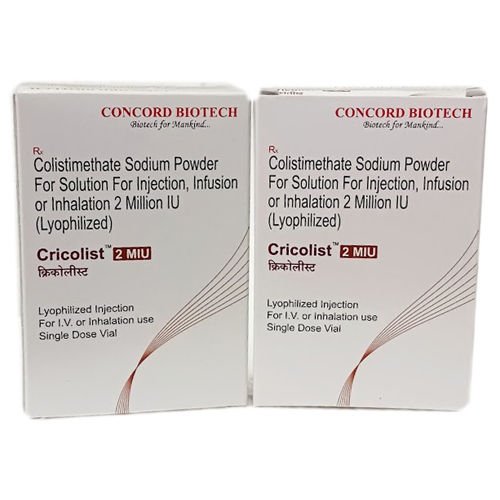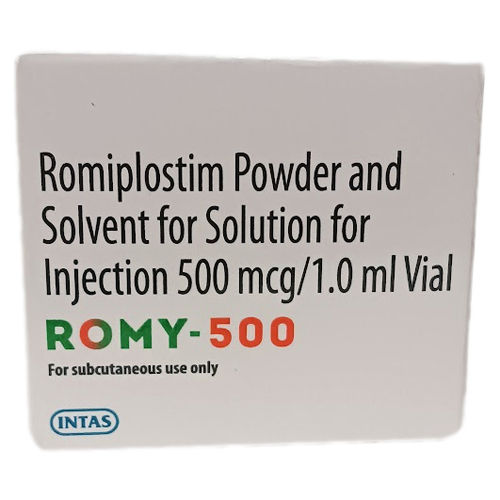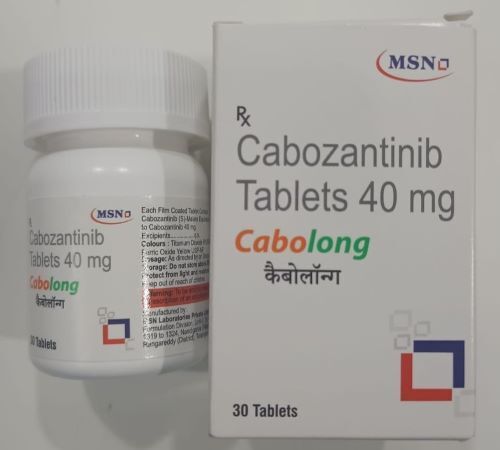Colistimethate Sodium For Injection
Product Details:
Colistimethate Sodium For Injection Price And Quantity
- 10 Pack
- 2000 INR/Pack
Colistimethate Sodium For Injection Trade Information
- Cash Advance (CA) Cash in Advance (CID)
- 1000 Pack Per Week
- 4 Days
- South India Central India West India North India East India Gujarat Karnataka Kerala Lakshadweep Mizoram Meghalaya Manipur Andhra Pradesh Bihar Chandigarh Daman and Diu Goa Jharkhand Odisha Punjab Assam Delhi Dadra and Nagar Haveli Andaman and Nicobar Islands Arunachal Pradesh Chhattisgarh Haryana Himachal Pradesh Jammu and Kashmir Madhya Pradesh Maharashtra Nagaland Rajasthan Sikkim Tamil Nadu Telangana Tripura Pondicherry Uttar Pradesh Uttarakhand West Bengal All India
Product Description
Colistimethate sodium is a medication used primarily for the treatment of bacterial infections, particularly those caused by multidrug-resistant strains of bacteria. It is a prodrug that is converted in the body to colistin, which is the active form responsible for its antibacterial effects.
Colistimethate sodium is administered via intravenous (IV) or inhaled routes, depending on the type and severity of the infection being treated. It is often reserved for severe infections caused by Gram-negative bacteria that are resistant to other antibiotics, such as Pseudomonas aeruginosa, Acinetobacter baumannii, and certain strains of Klebsiella pneumoniae.
This medication works by disrupting the bacterial cell membrane, leading to leakage of intracellular contents and ultimately bacterial cell death. Colistimethate sodium is typically used as a last resort when other antibiotics have failed or when the infection is known to be resistant to standard treatments.
Due to its potential for kidney toxicity and neurotoxicity, colistimethate sodium is generally used cautiously and with close monitoring of kidney function and neurological status. Common side effects may include kidney damage, neurotoxicity (including confusion, dizziness, and muscle weakness), and gastrointestinal disturbances.
As with any medication, it's essential to use colistimethate sodium as directed by a healthcare professional and to report any concerning side effects promptly.
*FAQS
-
What is Colistimethate Sodium?Colistimethate Sodium is an antibiotic medication used to treat bacterial infections, particularly those caused by multidrug-resistant strains of bacteria such as Pseudomonas aeruginosa and Acinetobacter baumannii.
-
How does Colistimethate Sodium work?Colistimethate Sodium works by disrupting the outer membrane of bacterial cells, leading to cell death. It is specifically effective against Gram-negative bacteria.
-
What conditions does Colistimethate Sodium treat?Colistimethate Sodium is primarily used in the treatment of infections caused by multidrug-resistant Gram-negative bacteria, including pneumonia, urinary tract infections, bloodstream infections, and infections in patients with cystic fibrosis.
-
How is Colistimethate Sodium administered?Colistimethate Sodium is administered as an intravenous infusion (into a vein) or as an intramuscular injection (into a muscle). The dosage and frequency of administration will depend on the severity of the infection, the patient's kidney function, and other factors. It's crucial to follow the instructions provided by your healthcare provider.
-
What are the common side effects of Colistimethate Sodium?Common side effects of Colistimethate Sodium may include nephrotoxicity (kidney damage), neurotoxicity (nerve damage), respiratory distress, allergic reactions, and gastrointestinal disturbances such as nausea, vomiting, and diarrhea.
-
Who should not take Colistimethate Sodium?Colistimethate Sodium may not be suitable for everyone. Patients with a history of hypersensitivity to colistin or any other component of the medication may not be able to take Colistimethate Sodium safely. It's crucial to inform your healthcare provider about your medical history and any medications you are currently taking before starting Colistimethate Sodium.
-
Is Colistimethate Sodium safe during pregnancy and breastfeeding?Colistimethate Sodium should be used during pregnancy only if the potential benefits justify the potential risks to the fetus. It is not known whether Colistimethate Sodium passes into breast milk, so breastfeeding is typically not recommended while receiving treatment with Colistimethate Sodium. It's essential to discuss the risks and benefits with your healthcare provider if you are pregnant, planning to become pregnant, or breastfeeding.
-
Are there any interactions with other medications?Colistimethate Sodium may interact with other medications, including other antibiotics and medications that affect kidney function. It's crucial to inform your healthcare provider about all medications you are taking, including prescription drugs, over-the-counter medications, vitamins, and supplements, to avoid potential interactions.

Price:
- 50
- 100
- 200
- 250
- 500
- 1000+







 Contact Us
Contact Us
